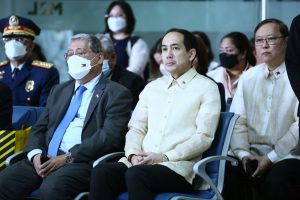Asked about his achievements during his first 100 days as president of the Philippines, Ferdinand “Bongbong” Marcos said he was able to put up a “functional government.”
“I think what we have managed to do in the first 100 days is put together a government which is functional and which has a very, very good idea of what we are targeting in terms of strict economic targets,” Marcos said in October during his speech before the Manila Overseas Press Club.
But a resolution passed by his party, the Partido Federal ng Pilipinas (PFP), hinted at several irregularities inside the presidential palace.
The resolution, signed on November 11 but released to the media on November 22, expelled the former Executive Secretary Vic Rodriguez from the PFP “for his incompetence as a public servant, conduct inimical to the interests of the party, abuse and breach of trust and confidence reposed on him by the President and the party, abandonment, and disloyalty.”
The PFP said Marcos did not participate in the deliberation of the resolution but made no objection to it.
Rodriguez was the spokesperson and campaign manager of Marcos and was immediately appointed executive secretary after the election. He resigned his post in September citing the need to spend more time with his family, but analysts believe he was forced to step down after allegedly approving a sugar importation deal without the knowledge of Marcos, who is concurrently serving as agriculture secretary.
The PFP resolution has made public what others have suspected about the questionable transactions of Rodriguez. PFP officials accused Rodriguez of abusing his position and bemoaned the non-appointment of party members in the Marcos cabinet. They did not mince words in castigating Rodriguez. “PFP’s ties with respondent must be cut off immediately like a gangrene to prevent his further poisoning of the PFP body politic…[Rodriguez] started his tenure in government as Lancelot, accumulated vast powers and transfigured into Lucifer in less than three months,” the party’s executive committee said in its resolution.
The resolution may focus on Rodriguez but it also unintentionally exposed the “chaos” that characterized the first three months of the Marcos government.
“In the 77 days that he was in office, Rodriguez’s tenure was marked by chaos, confusion, disorder, intrigue, instability, nepotism, charges of appointments-for-sale, ’empire building’ and plotting against his perceived detractors,” the resolution stated. “His first executive order, firing some 4,000 government employees without providing for their replacements, was a disaster. What followed was confusion and paralysis in the government service.”
The executive secretary is known as the “little president” because of the broad powers that he or she can wield in the government. It is revealing and also embarrassing that the group which has exposed the “confusion” inside the new government has come not from the opposition but from within the president’s own party.
Marcos has yet to comment on the issue but in a speech delivered in front of career officials, he reminded his fellow public servants to resist corruption.
“Remember that we are here not for our own gain,” he said. “We are here to bring forth a government that provides for the needs of the people. Most importantly, let us be vigilant against temptation and corruption and other acts that diminish the public trust.”
In an interview with the media, Rodriguez described the resolution as “washing your dirty linens in public,” which he said was “not helping the President.” He said he could not appoint unqualified individuals to the government even if this would mean being tagged as disloyal to the party.
He also downplayed the impact of the PFP resolution. “I couldn’t understand why a simple reorganization of a very small party needs to be disclosed to the media,” he said.
Rodriguez could be merely trying to defend himself, but he also belittled the political influence of the president’s party. Marcos may have garnered 31 million votes, but his party only has two elected members in Congress.
The “reorganization” of the Marcos government did not stop with the resignation of Rodriguez. Those perceived to be on his side, including the press secretary, also quit their positions in the cabinet. There are reports that the 1,500 appointments made by Rodriguez could be reversed by the new executive secretary.
Throughout the campaign period and after becoming president, Marcos has consistently called for unity to move the country forward. Ironically, his subordinates and fellow party members are pursuing this by purging their rivals in public service.

































